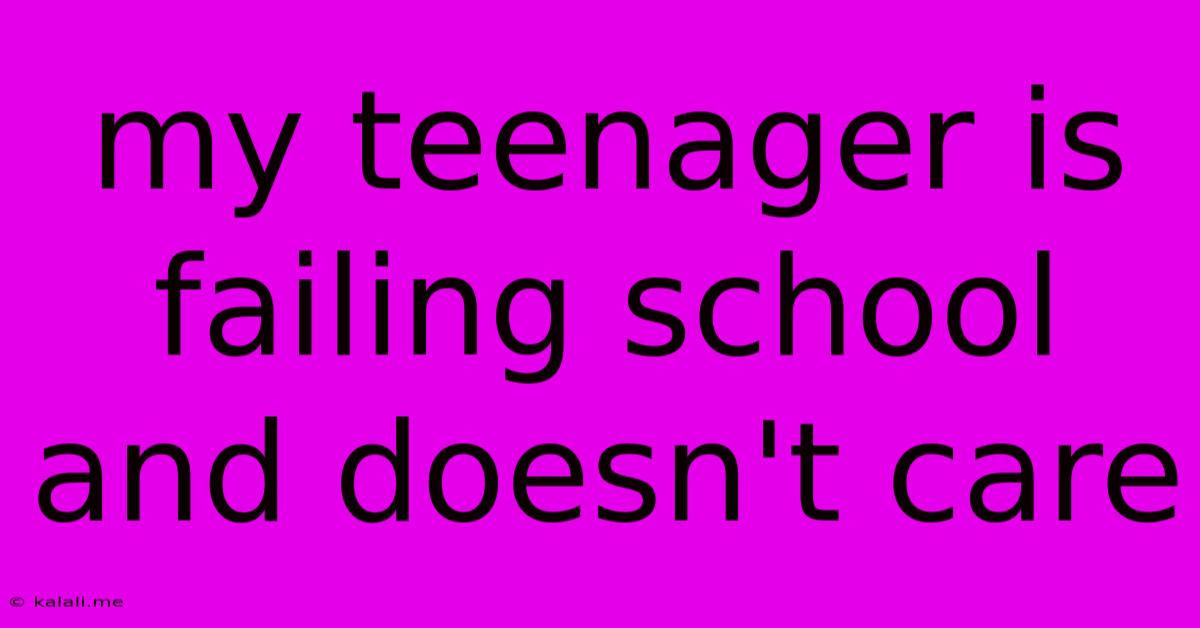My Teenager Is Failing School And Doesn't Care
Kalali
Jun 03, 2025 · 3 min read

Table of Contents
My Teenager is Failing School and Doesn't Care: A Guide for Concerned Parents
It's heartbreaking to see your teenager struggling academically and seemingly unconcerned. This feeling of helplessness is shared by many parents. This article explores the potential reasons behind this behavior and offers strategies to help your teen turn things around. Understanding the underlying causes is crucial before implementing solutions.
Why is My Teenager Failing and Unmotivated?
The reasons behind academic failure and lack of motivation in teenagers are complex and often interconnected. It's rarely a single issue; rather, a combination of factors often contribute to the problem. Here are some key areas to consider:
Academic Struggles:
- Learning Disabilities: Untreated learning disabilities, such as dyslexia or ADHD, can significantly impact a teen's ability to succeed in school. These challenges often manifest as difficulties with reading, writing, focusing, or organization. Early diagnosis and intervention are vital.
- Subject-Specific Challenges: Struggling in a particular subject can create a domino effect, impacting overall motivation and performance. A lack of understanding in one area can make other related subjects harder to grasp.
- Poor Study Habits: Ineffective study techniques, lack of organization, procrastination, and poor time management all contribute to poor academic performance.
- Lack of Support: Insufficient support from teachers or peers can leave teens feeling lost and overwhelmed.
Emotional and Social Factors:
- Depression and Anxiety: Mental health issues like depression and anxiety are frequently linked to academic underperformance. These conditions can severely affect concentration, motivation, and overall well-being.
- Social Issues: Bullying, social isolation, or peer pressure can significantly impact a teenager's emotional state and, consequently, their academic performance.
- Family Conflicts: Stressful family dynamics, including conflict or instability at home, can negatively affect a teen's focus and ability to succeed in school.
- Lack of Self-Esteem: Low self-esteem can lead to a lack of confidence in their abilities, resulting in avoidance of academic challenges.
External Factors:
- Excessive Screen Time: Excessive use of electronic devices can lead to sleep deprivation, reduced attention span, and decreased motivation for schoolwork.
- Part-Time Jobs: While a part-time job can teach valuable skills, an overwhelming workload can negatively impact academic performance.
What Can Parents Do?
Addressing your teenager's academic struggles requires a multi-faceted approach:
Open Communication and Understanding:
- Create a Safe Space: Foster an environment where your teenager feels comfortable expressing their feelings and concerns without judgment.
- Active Listening: Listen attentively to your teen's perspective, validating their feelings even if you don't agree with their actions.
- Avoid Blame and Criticism: Blaming or criticizing will only worsen the situation. Focus on solutions and support.
Seeking Professional Help:
- School Counselor: Connect with your teen's school counselor for guidance and resources.
- Therapist or Psychologist: Consider seeking professional help from a therapist or psychologist to address underlying mental health concerns or family issues.
- Educational Psychologist: An educational psychologist can assess for learning disabilities and recommend appropriate interventions.
Practical Strategies:
- Establish Routines: Create a structured daily routine that includes dedicated time for studying and homework.
- Study Skills Support: Help your teen develop effective study habits, time management skills, and organizational strategies.
- Monitor Progress: Regularly check in on your teen's progress, offering support and encouragement along the way.
- Positive Reinforcement: Celebrate even small successes to boost motivation and confidence.
- Limit Screen Time: Implement reasonable limits on screen time to improve sleep, attention, and overall well-being.
Addressing a teenager's academic struggles requires patience, understanding, and a collaborative approach involving parents, educators, and potentially mental health professionals. By working together, you can help your teen overcome these challenges and achieve their academic potential. Remember, early intervention is key, and seeking professional help is a sign of strength, not weakness.
Latest Posts
Latest Posts
-
Car Leaking Oil After An Oil Change
Jun 05, 2025
-
Gfci Light Is Green But No Power
Jun 05, 2025
-
Steam Deck How To Pull Up Keyboard In Desktop Mode
Jun 05, 2025
-
How To Take Off Delta Shower Handle
Jun 05, 2025
-
Sql Server Copy Table With Data
Jun 05, 2025
Related Post
Thank you for visiting our website which covers about My Teenager Is Failing School And Doesn't Care . We hope the information provided has been useful to you. Feel free to contact us if you have any questions or need further assistance. See you next time and don't miss to bookmark.